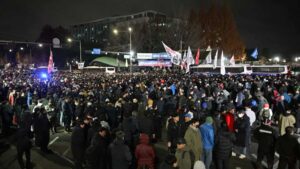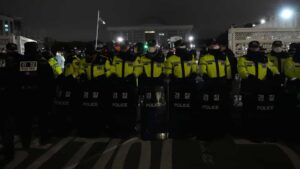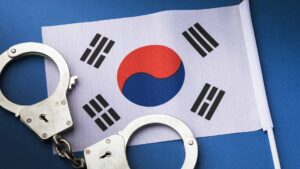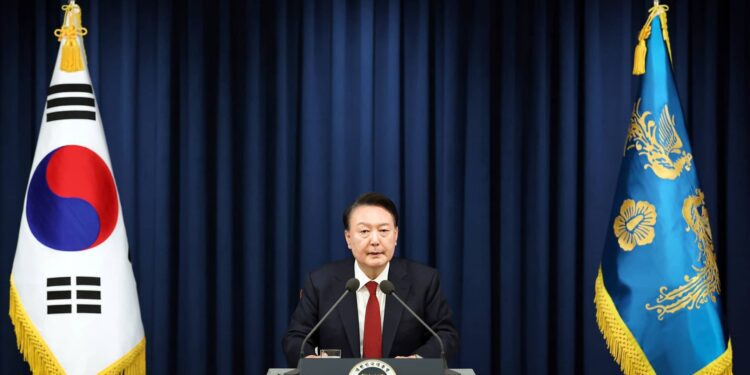South Korea President Yoon Suk Yeol announced martial law in an unprecedented action, alleging political instability and dangers to national security Late on December 3, 2024.
The democracy of South Korea and South Korea government is currently at a turning point. A nationwide outrage has swiftly grown out of what began as President Yoon’s political crisis. The nation intensely observers whether the political unrest will lead to a substantial change in South Korea’s democratic system as the opposition proceeds with the accusation process.
This is the first time the nation has been under military control in almost 50 years history of south Korea. Widespread protests, argumentative parliamentary discussions, and concerns about the future of South Korea’s democracy have all been triggered by Yoon’s abrupt decision.
It was shocking as the news abruptly came out putting the stability of nation at stake.
Overview of South Korea President Martial law announcement

The unexpected declaration of martial law by South Korean President Yoon Suk Yeol on December 3, 2024, rocked the nation. Many saw the late-night action as an extreme step in the face of escalating political unrest, and it provoked strong criticism and protests.
After parliament vetoed the proclamation, the South Korea government canceled it just hours later. Serious concerns were raised over the president’s crisis management and the democratic integrity of South Korea.
The sudden imposition of martial law or military rule by President Yoon followed weeks of political disputing with the opposition. During a late-night speech, Yoon charged that the opposition Democratic Party was sympathetic to North Korea and involved in “anti-state activities.” He asserted that these measures were a threat to national security and had stopped government operations. Yoon claimed that in order to eradicate these “anti-state elements” and protect South Korea’s democratic liberties, martial law was required.
Soldiers were sent to strategic sites, such as the National Assembly, in response to the South Korea President order. The military gave authorities the authority to make arrests without a warrant and prohibited political activity, such as marches and strikes. Thousands of South Koreans protested outside the parliament building as tensions swiftly increased.
Furthermore, Lawmakers Prevent the Imposition of Martial Law When the South Korean parliament met early on December 4, 2024, to vote on the martial law proposal and the situation of South Korea politics drastically changed. The president’s order was essentially overturned when 190 of the 300 members voted against the declaration. Protesters and parliamentarians disobeyed the order despite the strong military presence, and the vote proceeded with reasonable peacefulness.
Nonetheless, the military started to disband as soon as the martial law decree was reversed, and soldiers exited the National Assembly. People screamed chants demanding South Korea President resignation and applauded. Yoon, who had been under mounting pressure as a result of numerous corruption scandals and mounting hostility from his political opponents, suffered a major setback at this time.
This act and turns of events in South Korea politics stunned the country. The declaration of martial law, however, soon proved argumentative since it was generally believed to be a reaction to domestic political pressure rather than an outside emergency.
Timeline of Key Events
- April 11, 2024: In the National Assembly elections, opposition parties win a landslide victory and take over more than 60% of the seats.
- May 9, 2024: Following allegations that his wife accepted unlawful gifts, South Korea President apologizes.
- November 29, 2024: Yoon’s South Korea government budget is reduced, and top prosecutors and other cabinet officials are charged by the opposition.
- December 3, 2024: In response to political pressure, Yoon imposes martial law; but, hours later, the parliament votes it down.
Political opposition and public outrage

Members of South Korea President own party and the political opposition in South Korea suddenly condemned the announcement, claiming it was unlawful and unconstitutional. Lee Jae-myung, the head of the liberal opposition, called on people to protest against martial law or military rule. To express their dissatisfaction, thousands of people gathered outside parliament and chanted against martial law.
The protests were mostly peaceful in the face of the military’s strong presence. Some lawmakers even scaled barriers to get into the National Assembly and vote on the decree, defying the martial law regulations. An important win for the nation’s democratic forces came early on December 4, when parliament decisively decided to declare Yoon’s declaration of martial law illegal.
The reason why South Korea President Yoon declared martial law

For months, South Korea politics status of Yoon had been failing. His popularity had fallen to all-time lows after he was elected as a conservative candidate in May 2022, mostly as a result of his wife’s scandals and many political blunders. Among the many challenges Yoon’s government had to deal with was the opposition’s overwhelming win in the April 2024 elections, which gave them control of the National Assembly.
Political stalemate was further worsened when the opposition attempted to charge a number of Yoon’s cabinet members.
Many people believed that South Korea President Yoon’s move to impose martial law was an effort to maintain power and stop additional political harm. Critics counter that the action was an overreach and a last-ditch effort to hold onto power in the face of growing scandals and calls for his prosecution.
The Democratic Challenge in South Korea politics

In South Korea, martial law is a combative policy with historical significance. The last time it was used was during the military government that ruled the nation in 1979. South Korea has taken pride in its democratic principles and political stability ever since the democratic transition of country in 1987. The country has been rocked by South Korea President Yoon’s announcement, and many people are wondering if South Korea’s democracy is in danger.
Despite its brief duration, experts say that the imposition of martial law might seriously harm South Korea politics standing as a strong democracy. Leif-Eric Easley, a political expert, stated that Yoon’s activities run the risk of compromising the nation’s reputation internationally. The state of affairs has sparked grave worries about the South Korea government, political climate and power dynamics of the nation going forward.
Nevertheless, the opposition Democratic Party has demanded that South Korea President be removed from office following the parliamentary vote to lift the martial law order. The prosecution would need the backing of more than two-thirds of the National Assembly’s 300 members in order to pass the vote, which is set for Saturday.
The Constitutional Court, which has the power to remove the president from office, will hold a trial if the prosecution is accepted. Since this would be the third time in history of South Korea that a sitting president has been prosecuted, the procedure would be historic.
In addition to apologizing, the head of South Korea President ruling People’s Power Party demanded responsibility and called for the military minister who had suggested martial law to be fired.
Moreover, there has been Global Responses as International apprehension was also raised by the declaration of martial law. The United States expressed serious worry over the developments while reaffirming its relationship with South Korea. The two nations have a long-standing defense pact, thus the stability of the region is greatly affected by this unexpected political disturbance.
Nonetheless, South Korea President is under growing pressure to address the public’s and opposition’s concerns as South Korea emerges from this political crisis. Lawmakers will begin the impeachment process in an effort to hold the president responsible for his deeds.
Many South Koreans are demanding a return to normality and the defense of their rights, while others are left wondering about the future of their democracy, South Korea politics and the legitimacy of their government.













